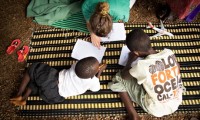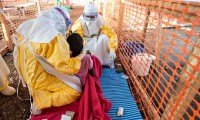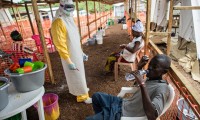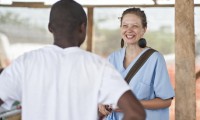An MSF psychologist reveals the trauma of dealing with the Ebola outbreak for medics, cleaners and the families of the dead
Ane Bjøru Fjeldsæter is a 31-year-old psychologist from Trondheim, Norway. For the past month, she has been working for Médecins sans Frontières (MSF) in Kailahun, Sierra Leone, helping to fight the largest ever outbreak of Ebola, which has killed more than 600 people in three countries. She provides support and counselling to patients and their families, as well as to the staff whose job it is to deal with the dead bodies.
I was expecting the Ebola epidemic to be quite gruesome and unlike anything I had seen before. But I really didn't expect its magnitude – this outbreak is enormous. In Sierra Leone, it killed off a lot of health workers before MSF even arrived. Not surprisingly, medical staff were reluctant to work with us at first. They'd never come across Ebola before – but at least they had previous experience of people suffering and people dying. But for the non-medical staff, like the hygienists – our hospital cleaners – it's been a new and disturbing experience, and a large part of my work involves helping them with counselling and support.
The hygienists have the hardest job of all because they are the ones dealing with the dead bodies. Since our Ebola centre opened two weeks ago, we've had 37 deaths: an average of two or three a day. A lot of the cleaners are young, unskilled workers. In an area with an unemployment rate of 95%, they jumped at this opportunity to get a job.

Dealing with the dead bodies is disturbing: the hygienists experience feelings of sadness and fear, but also disgust. When Ebola patients die, there's bleeding, vomiting and diarrhoea. The cleaners tell me they have flashbacks of the things they have seen and of things they have smelled. Even wearing a mask, you can't shut out all the smells.
Traditionally, in Sierra Leone, dead bodies are taken care of by the tribal elders. A lot of the hygienists feel they are too young to be dealing with the dead, so worry they're being disrespectful of their culture's traditions. We make sure that on each shift there is always one man and one woman, so that when someone dies, there will always be someone of the same sex to tend to them.
The local staff experience huge stigma from the community. The son of one of our workers recently died from malaria. People in his village immediately said he had caused his son's death because he was working with Ebola. It was very distressing for him.
The stigma makes it hard for the hygienists. We tell them: "You are heroes, you're doi
When we discharge a patient who has survived Ebola, it makes an enormous difference to them. On Tuesday, three people who had been cured were discharged from the isolation ward, and all the cleaners were dancing, deliriously happy and taking photographs. They find ways to manage the stress: they take good care of each other; when someone is upset, they talk about it, and they are very open about voicing their concerns and difficulties.
Still, the local staff have had their lives turned upside down. But then throughout the entire district everything is upside down. Here in Kailahun, the banks are shut, the schools have been closed for more than a month, and the students are very upset that they are missing their exams. A lot of people are isolated by the fear that if they go near other people, they will get the disease. People are at a loss to understand what is happening to them.

The nurses told me she didn't know how to speak. For the two days she'd been in the ward, she'd been so shocked that she hadn't uttered a word. This can happen to children – it's called elective mutism. When she came out, she was in shock: she didn't make eye contact; she didn't speak to anyone. We put her in a chair and she turned around, with her back to the world.
It must have been a terribly disturbing experience for a child: to see someone come into the ward in a spacesuit; to hear them speaking to her mother in words she didn't understand; to see her mother start crying; and then to be handed over to the stranger in the spacesuit and carried off.
I sat with her for four hours, trying to talk to her in a calm and normal voice and singing her songs, to see if the shock would pass. By the end of the four hours she had turned around and was facing me. She made eye contact, she put her hand out for me to touch her, she tried to start a conversation with me. You could see that she was starting to warm up to me, and that she wasn't in the same condition.
Bintu became an orphan that day. She is in the care of our child protection partner and they will locate other family members who can take care of her. She will need to be monitored for 21 days to see that she does not develop the disease herself.


We are so polite- to these doctors coming to cure us- we have to wake up and see that west to cure us is risky. We tend to put our trust in them and they had let us down in the past, the Bill Gates injection plan had already parlysed children in India. For us to give this to our children – is aq risk. We all grew up without it. we have to takle certain roots and herbs to improve our ammune system as this ebola crises would be a first for many. Build our ammune system up.